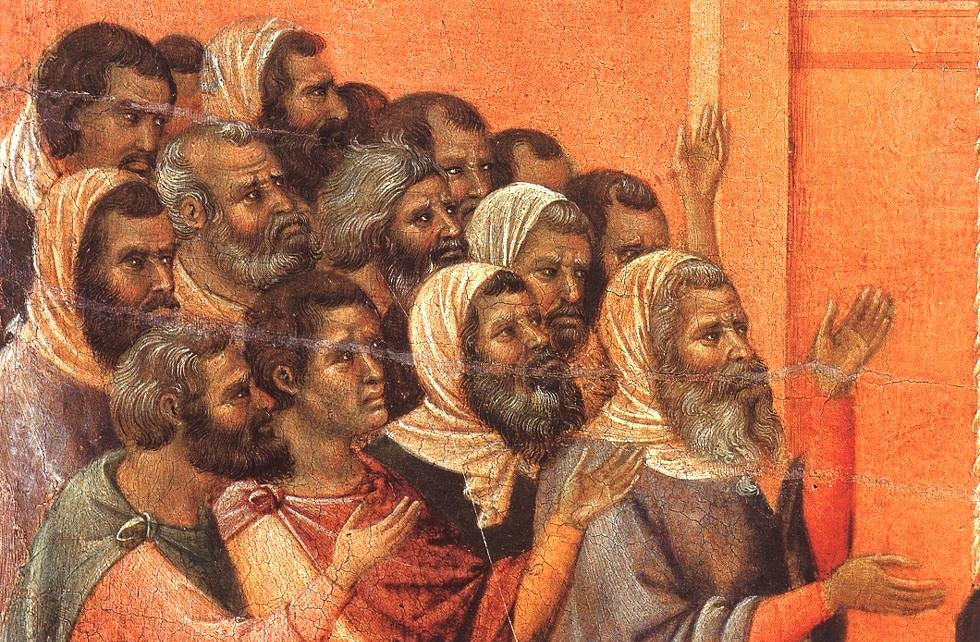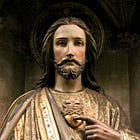What is the ‘appetite for destruction’ that drives false prophets?
Christ predicts the malice of those priests who would betray Him then, and for centuries to come.

Christ predicts the malice of those priests who would betray Him then, and for centuries to come.
Editor’s Notes
Did you miss our 1,000 subscriber milestone post? Check it out here:
In this section, Fr. Coleridge tells us…
How Christ foresaw not only His own persecutors, but generations of false teachers to come.
That spiritual blindness and clerical ambition would lead many to reject truth and abuse authority.
Why false prophets seek not merely error—but destruction, scattering, and ruin of souls.
He shows us that false teachers are not simply mistaken—they are ravenous, cunning, and prophetic fulfilments of Christ’s own warning.
For more on the context of this episode, see Part I.
See also the below on this topic:
Christ warned us about those who hide their errors under the guise of orthodoxy:
Beware of false prophets, who come to you in the clothing of sheep, but inwardly they are ravening wolves.
By their fruits you shall know them. Do men gather grapes of thorns, or figs of thistles? Even so every good tree bringeth forth good fruit, and the evil tree bringeth forth evil fruit. (Mt. 7.15-17)
He does not say “believe that they are sheep, because otherwise you are being uncharitable.”
He does not say “it is a spiritual discipline to read their works and try to find some good in them.”
He says: “Beware.”
The False Prophets
The Sermon on the Mount (To the End of the Lord’s Prayer)
Chapter XV
The False Prophets. St. Matt. vii. 15—20;
Story of the Gospels, § 34
Burns and Oates, London, 1878
Why did Christ warn of false teachers so early in His ministry?
What is the ‘appetite for destruction’ that drives false prophets?
Why the Apostles and New Testament so fiercely condemned heresy
[After warning His disciples of false prophets who appear in sheep’s clothing but are inwardly ravening wolves, our Lord now seems to have in view those very enemies—chief among them the Scribes and Pharisees—who were already beginning to oppose Him under cover of zeal.]
Prophetical character of his words
These men, then, seem to have been in the first instance present to the mind of our Lord when He spoke these famous words about the wolves in the clothing of sheep. But it has been already said that it is our Lord’s wont, in discourses like this before us, which were to last for all time and to serve the needs of all generations in the Catholic Church, to look far beyond the immediate occasion on which He was speaking, and to embrace in His view the future history and trials of His children to the end of the world. And certainly here also we might well claim for the words on which we are commenting the character of a prophetical denunciation, the prediction of a state of things which human foresight could never have divined.
It might have been thought, indeed, that the Chief Priests themselves, and the rulers of the sacred people, would have been the first to be moved by the marvellous cogency of the various heads of evidence which witnessed to our Lord’s Divine mission, by the beauty of His teaching, by the majesty and heavenly sweetness of His character, by the fulfilment of the prophecies and types in His Person, by the splendour of His miracles, the manner in which He satisfied in His doctrine all the wants and needs and questions of the human soul.
Our Lord expressed His astonishment at the blindness of the teachers of Israel in His discourse to Nicodemus, and it may well seem one of the problems of history that the ecclesiastical rulers did not at once seek a place in His Kingdom—or at least, it might well seem such a problem, if we did not know how the human heart is hardened by ambition and blinded by jealousy, and how difficult it is, beyond all other difficulties, to turn the hearts of priests of impure life, or full of pride and ambition, in whom true interior religion has long died away.
But granting that the immediate reception of our Lord by the priests at Jerusalem might have been expected, and their persecution of Him predicted, what mind, however versed in the malignity of which our nature is capable, could ever have seen the depravity, the malice, the cunning, the restless perversity and ingenuity which have been displayed in the subsequent history of the Church by the false teachers to whom His words are meant to apply!
Excommunication of the man born blind
Thus the words of our Lord of which we are here speaking are full of prophecy, of which we have the fulfilment even in His own lifetime, in the attempted seduction of His disciples in Galilee, on which we have been speaking. He seems to refer to attempts of the same kind in the last year of His teaching, in the discourse which He delivered after He had wrought at Jerusalem His great miracle on the man who had been born blind.
This man had been excommunicated by the Jewish rulers for believing in our Lord, and thus the official representatives of God in the holy nation had set themselves in direct opposition to Him present among them, the True Shepherd of the fold, to be separated from Whom was the truest, the only true, excommunication.
This fact is to be borne in mind in reading the discourse of our Lord in the tenth chapter of St. John, where our Lord declares that He is Himself the door to the fold, and that all that did not enter through Him were thieves and robbers. Thus His enemies had pretended to have the authority to exclude His followers from the fold, whereas it was only through Him that any one could enter it, much less exercise any authority or jurisdiction therein. In the sequel of the same discourse He uses the other images of the hirelings and the wolf, and of the rapacity of the false teachers, to steal, to kill, and to destroy, to catch the sheep and scatter them.1
This appetite for destruction, which is characteristic of a teacher of falsehood, is noted by our Lord in the passage of the Sermon on the Mount on which we are commenting by the epithet of ‘ravening,’ which He applies to wolves in sheep’s clothing. We shall have occasion hereafter to speak of its meaning more fully.
The false teachers in the time of the Apostles
The Church had hardly been founded, when the evil on which our Lord here, as it were, puts His finger, became manifest. From the very beginning, there were attempts made to usurp the authority of the Apostles and of those delegated by them, and to lead the faithful astray by false doctrines. The letter sent by the Apostles after the first Council at Jerusalem to the Gentile converts begins with complaining that ‘some going out from us have troubled you with words, subverting your minds, to whom we gave no commandment.’
Here we have the twofold evil, the assumption of authority and the propagation of false doctrine. As we proceed in the history of the Acts, we find continual instances of the immense activity with which the teachers of falsehood beset the onward progress of the Gospel on every side. They fill a large space in the history and in the Epistles—a space which they have since held in the annals of the Church.
They attacked not only St. Paul, who was, of course, the object of particular animosity to the Jews and the Judaizing party among Christians, but the other Apostles also.
We shall see particular instances of this in the next parts.
Subscribe now to never miss an article:
The False Prophets
Why did Christ warn of false teachers so early in His ministry?
What is the ‘appetite for destruction’ that drives false prophets?
Why the Apostles and New Testament so fiercely condemned heresy
Here’s why you should subscribe to The Father Coleridge Reader and share with others:
Fr Coleridge provides solid explanations of the entirety of the Gospel
His work is full of doctrine and piety, and is highly credible
He gives a clear trajectory of the life of Christ, its drama and all its stages—increasing our appreciation and admiration for the God-Man.
If more Catholics knew about works like Coleridge’s, then other works based on sentimentality and dubious private revelations would be much less attractive.
But sourcing and curating the texts, cleaning up scans, and editing them for online reading is a labour of love, and takes a lot of time.
Will you lend us a hand and hit subscribe?
Follow our projects on Twitter, YouTube and Telegram:
St. John x. 1–13.




This fits with my experience. They seek the destruction of souls because they are on the side of the devils.